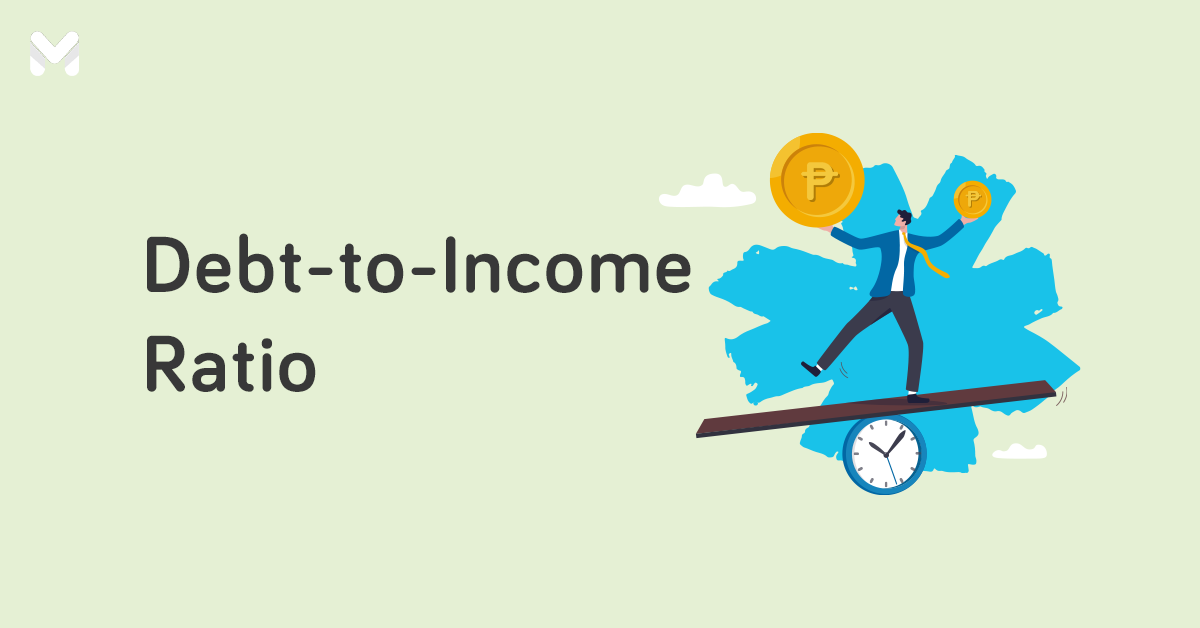Credit is for sure something you’ve heard about before, although one that you probably thought you’d never need—until now. After all, a good credit standing comes with a lot of perks, like getting approved for a higher loan amount faster.
If you’re only now jumping on the time-tested bandwagon that is credit, don’t worry—it’s never too late. As a newly inducted denizen to the world of credit, you have your work cut out for you. But fret not—with proper guidance, you can achieve decent status in no time.
Here’s how to build a credit score from scratch.
Credit Score, Explained

Your credit score is a rating that represents how responsible you are in managing your finances, specifically in handling debt. This score is used by banks and loan providers as a strong basis for approving or denying your credit card and/or loan applications. If your credit score is high enough, you can even use it as a bargaining chip when negotiating loan rates.
👉 How Your Credit Score Is Generated
Before you consider how to build your credit score in the Philippines, you should first learn where and how your credit score is generated. The way it works is that lending institutions and other relevant service providers routinely submit their clients’ updated information to the government’s credit bureau, i.e., the Credit Information Corporation (CIC), in compliance with the Credit Information System Act or R.A. No. 9510.
The CIC compiles all credit information into credit reports that are shared with the same lending institutions and service providers, to be used as basis when approving loans and credit card applications. The CIC can also share the individual reports with their respective owners, enabling the latter to keep tabs on their credit standing.
👉 How Your Credit Score Is Calculated
While there’s no specific formula to compute your credit score, credit bureaus usually consider the following information to determine your score, which will range from 300 to 850:
- Length of your credit history
- Number and types of credit accounts under your name
- How often you’ve opened new credit accounts
- Remaining balances of your credit accounts
- Payment history of your credit accounts
- Active and rejected credit card or loan applications
- Public financial records (judgments, bankruptcies, and foreclosure proceedings, etc.)
Why is it Important to Establish a Good Credit Score?
-Jan-23-2024-02-49-11-1463-AM.png?width=600&height=400&name=Pics%20for%20blog%20-%20600x400%20(1)-Jan-23-2024-02-49-11-1463-AM.png)
You need to start learning how to build your credit score in the Philippines to enjoy these:
✔️ Higher Chances of Loan Approval
Before you can borrow a huge amount from any bank or loan provider, you’ll have to convince them first that you can pay them back. You can’t just go to the bank and make a pinky promise—you need to prove yourself.
Having sizable savings can’t help you much on this front, as that’s not enough proof that you’re a responsible borrower. To assert your creditworthiness, you need a good credit standing to back you up.
✔️ Faster Approval for Credit Card Application
Getting approved for a credit card is not always easy, especially if you’re applying for one that’s beyond entry level. Before you go out and compare different credit card options, make sure you have a good credit score so that you can guarantee a fast approval time and a more seamless application process overall.
While there’s still a chance you can get a credit card even with no existing credit history, your options will be significantly limited. The exciting and feature-heavy cards are reserved for those with good credit standing.
✔️ Better Interest Rates
Since you’re still credit invisible (meaning an individual with no established credit score yet), expect that no loan provider will fully trust you from the get-go.
This doesn’t mean you’ll never be approved for a card or loan. You can still take out loans and get credit; you’ll just be slapped with hefty interest rates as a safety measure. Build a good credit score to avoid this inconvenience in your future loan applications.
Same goes with credit cards as well. For you to score credit cards with zero to low interest rates, you have to convince banks that you’re responsible enough to use a credit card. You won’t get approved if you have zero to no credit history to begin with.
Thus, a good credit score can be your ticket to saving more money in the future.
How to Build Credit Score with No Existing Credit History
-Jan-23-2024-02-51-02-0643-AM.png?width=600&height=400&name=Pics%20for%20blog%20-%20600x400%20(2)-Jan-23-2024-02-51-02-0643-AM.png)
Now that you’re ready to start building your credit score, you’re probably wondering how daunting a task you have before you. The answer depends on where you’re starting from.
If you’re a fresh graduate starting from scratch, you’ll have to do more to establish your credit footing. If you already have cash stashed in a savings account somewhere, you’ll have a relatively easier path.
Regardless, take the following steps so you can build your ideal credit score in no time.
📌 Get a Secured Credit Card
To kick things off, you should get a credit card to build your credit score. The easiest way to do this is to get a secured credit card as opposed to a standard one.
If you’re not familiar with this yet, read up on how secured credit cards work. Basically, the amount of money you have in your savings account will act as your credit line. So, the more savings you have, the higher your credit limit can be.
For someone with absolutely no credit history, this is the best way to build your credit score. For one, you can get approved instantly since your credit line is just 50% to 100% of your bank deposit. Plus, you won’t be mired in debt as you can use your savings to pay your monthly credit card bills in case you’re not able to shell out anything for any given month.
📌 Apply for a Regular Credit Card
If you don’t have a savings account, you can still try to apply for a regular credit card—but only if you know you’re ready for it.
You can choose among the best credit cards for low-income earners since these will most likely have less stringent requirements. Just don’t expect to get credit cards with amazing perks, especially if you’re still just starting to figure out how to build your credit score.
📌 Sign Up for a Phone Line
Another method to build up your credit score is to apply for a phone line. This is a good way to give credit bureaus more financial data that they can add to your credit report.
Feel free to get phone plans that come with the latest smartphone—but for the mere purpose of building your credit score from the ground up, getting a sim-only plan will do.
📌 Open Utility Accounts Under Your Name
Are you old enough to pay monthly bills? Ask your parents to change the billing name of your utility services to your name. This is a good way to become more financially responsible and learn how to build a good credit score.
And if you already have a secured credit card, you can use your credit card to pay bills. This can improve your credit score as long as you make timely monthly payments.
Tips on How to Build Your Credit Score Fast
-Jan-23-2024-02-57-55-6867-AM.png?width=600&height=400&name=Pics%20for%20blog%20-%20600x400%20(4)-Jan-23-2024-02-57-55-6867-AM.png)
Here are some dos and don’ts to help you build a decent credit record right out of the gate:
👍 Always Pay on Time and in Full
The process of building your credit history doesn’t end with setting up credit accounts under your name. You must back it up by fully paying your bills early or on time.
To help you develop the habit, you can set reminders days away from your bill’s cutoff. You can also set up an auto-debit payment in your bank account so you can automatically pay your bills every month.
👍 Spend Below Your Credit Limit
Getting approved for a secured or regular credit card for the first time is exciting, but don’t forget that it’s not a ticket to splurge above your means.
Always spend below your credit limit. That way, you not only avoid maxing out your card but also show credit bureaus that you’re a responsible spender. If you manage your credit limit wisely, it will reflect positively in your credit report, resulting in a better credit score.
👍 Make Small Purchases You Can Pay Off Right Away
Another tip on how to build your credit score fast is to make small purchases you can easily pay right away.
For example, you can get one of the top credit cards for groceries and use it for your monthly grocery expenses. Just pay your bills right away so you can add more ahead-of-time payments to your credit report.
👍 Diversify Your Credit Portfolio
As a beginner learning how to build your credit history, here’s one tip you shouldn’t miss: diversify your credit portfolio by exploring multiple credit types.
For example, if you have more than one bank, try applying for a secured or regular credit card from each of them.
👍 Avoid Applying for Multiple Credit Accounts at the Same Time
While it’s ideal to diversify your credit portfolio, it doesn’t mean you should apply for multiple credit accounts all at once. Applying for different credit lines at the same time can hurt your credit score, not boost it.
Take your credit journey one step at a time. If you have an ongoing credit card application, wait for it to be approved before attempting to apply for another one.
How to Build a Credit Score: FAQs
-Jan-23-2024-02-54-04-3105-AM.png?width=600&height=400&name=Pics%20for%20blog%20-%20600x400%20(3)-Jan-23-2024-02-54-04-3105-AM.png)
Below are some of the most common questions that credit invisibles ask about building credit from the ground up.
1. Do you start at zero when you build credit for the first time?
No, your credit score typically starts at 300, gradually building up to as high as 850 when you establish a good credit standing.
2. How long does it take to build your credit score from scratch?
There’s no one-size-fits-all answer to this as everyone’s credit journey is unique.
For example, even if 18 years old is the minimum age to open a bank account or apply for any financial product, there are still ways for minors to do the same.
If you’re starting from scratch, it might take a while, but if you’re consistent in cultivating money habits, you can build a good credit score in no time.
In fact, building your credit score from nothing can take less time than recovering from bad credit. It will take the credit bureau only months to gather enough financial data about you and give you a credit score; whereas if you damage your credit score by defaulting on your loan or missing a payment, it’ll take years to wipe off your bad credit history from your official record.
3. Can you build a credit score with a debit card?
While debit cards can be used almost the same way as credit cards, they can’t help you establish a credit history because you’re essentially using your own money instead of a credit line when making a purchase.
Since a credit score is a measurement of how you can manage debt, the only way to build credit is to borrow money through credit cards, loans, and other credit services.
4. What factors affect your credit score?
According to the CIC, the following are the factors used to compute a borrower’s credit score:[2]
- Payment history – Are you paying your bills on time? Are you paying your bills in full?
- Credit utilization ratio – Are you spending within your credit limit? Are you maxing out your card?
- Account history – How long have you had your credit accounts? How long has it been since you’ve used them?
- Credit types – How many credit cards, loans, or credit accounts do you have?
- New credit – How often have you opened or applied for new accounts?
5. Is the credit score included in the credit report?
No, your credit score is not included in your CIC credit report. You will have to request your credit score separately. Your credit report contains the following information, among others:[3]
- Full name
- TIN and SSS/GSIS numbers
- Place of residence
- Employment data
- Business information
- Loan contracts
Final Thoughts
Mastering how to build your credit score will take some time and effort, but the rewards waiting for you on the other side will definitely make it worth your while.
Not only that—the journey of building credit will also help you cultivate smart financial habits, so don’t shun it even if you’re intimidated by it. Instead, be open to learning more about credit and use it responsibly to improve your financial life.
Sources:
- [1] The History of Consumer Credit in One Giant Infographic (Visual Capitalist, 2017)
- [2] About Your CIC Credit Report (Credit Information Corporation website)
- [3] Sample CIC Credit Report (Credit Information Corporation website)







_1200x350.png?width=751&height=219&name=UB_PL_Generic_2_(Jan_2025)_1200x350.png)


